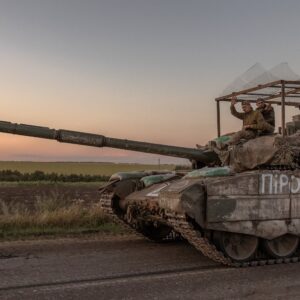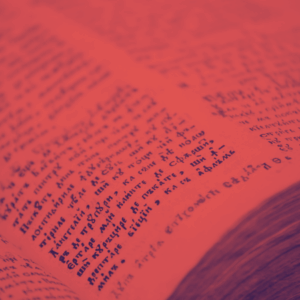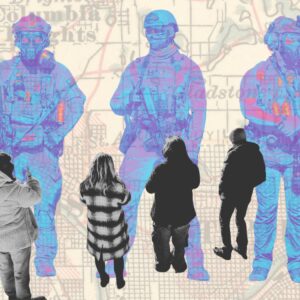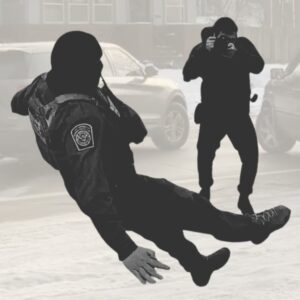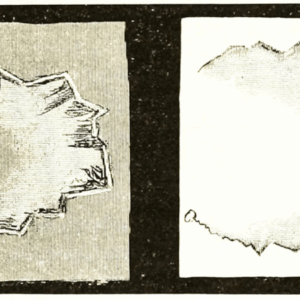
Remembering the Storyteller of Damascus, Before the War
Michelle Hoover, and in a Syria That Once Was
I don’t write true stories. I find them suspicious—the claim that any one place or person can be squared away neatly on a page. Fiction is safer territory. It leaves room for humility and mistakes. But in recent weeks, a line has been crossed—or it was crossed months ago or years and I’m only now catching up. I would be among the last to attempt pronouncements about a people and the question of their character, their worthy immigrant status. So I won’t attempt at all. The Syria I knew is disappearing. I want to try to tell you what I saw.
We first crossed the border on the road from Amman, myself and three Aussies, in a taxicab that tended to veer right—toward the roadside ditch drifting with plastic bags and beyond that a hundred miles of sand. This was Syria in 2009. Before the Arab Spring. Before the civil war. Before the rise of ISIL and the mass emigration. Even then, Americans were warned against traveling in the country, though I’ve never been one for warnings. I travel to places that make for rough going, to root out any fear of the unknown by attempting to know it instead. Still in our group of eight, I was the only U.S. citizen. I shied from admitting where I was from, but the locals guessed. Tell your friends to travel here, they said. Tell them we like Americans very much.
The Syrians I met hated their government. They took great pains to separate themselves from the Assad regime. When they spoke of American tourism, I realized they were asking for something bigger: they wanted the western world to remember them.
A half-hour into the country, we found ourselves stranded at an isolated mechanics shop on the highway. We were told another car would arrive to take us to Damascus, though the who and when remained in question. We squatted outside on plastic chairs, the mechanics lazing on the concrete or leaning against the shop with their cigarettes. There wasn’t much business. They seemed just as puzzled by our presence, though they offered a few friendly words in Arabic. We must have fallen into daydreaming. It was only later—an hour, maybe three—that we woke to realize the mechanics had disappeared. Another 15 minutes and one returned, curling his finger at us. We followed him down a long hall, past a row of small bedrooms and a tiled closet with a dank hole. In a back room were a dozen men sitting cross-legged on a dirt floor. Between them, layers of pita bread, falafel, and a saucepan brimming with tomatoes. They refused to charge us. Eat, eat, they said.
Because you have come to this place, the lesson seemed, we will give you what you need.
In the heart of Damascus I met a famous storyteller who presided over Al Nofara Café. He was known simply as el-Hakawati, the Storyteller of Damascus, though his given name was Abu Shadi-Rasheed Al Hallaq. While my friends sat outside smoking hookahs or left to wander the bazaars, I snagged a table in the crowd of men and waited for el-Hakawati to take up his chair on stage. He was a small man, balding, a paunch over his belt and a quick mischievous smile. He wore a Fez, tassel and all. El-Hakawati told his stories in Arabic, gesturing a wooden cane at his listeners to emphasize moments of great passion or fear. The crowd whooped and hollered. I thought: I don’t understand anything he’s saying. In only minutes, I thought: I understand everything. It was a tale of love, heroism, betrayal, and love again. I didn’t have to translate. At the end, el-Hakawati took a bow and twirled his hand in dramatic fashion. I had tears in my eyes. And I wasn’t the only one.
When the crowd cleared, I got up the nerve to ask to take a photograph with him. In it, we are both smiling and red-faced from the heat, two storytellers, one renowned and the other just getting her feet wet. We stand shoulder to shoulder in the door of the café, knowing barely enough of each other’s languages to speak pleasantries. Still he appeared to sense we shared similar vocations—or a similar belief in stories at least. What else could possibly matter to us?
I have often told my friends these stories. “Yes,” they say, “but what about the women?” I have to admit that once we crossed the border into Turkey, I felt as much nostalgia as relief. The weight of being watched had suddenly diminished. This is not a small thing for a woman, whether in the Middle East or on the sidewalks of any American city.
The day our group visited the Umayyad Mosque in Damascus, the women were given robes with pointed hoods. When we pulled them over our heads, our peripheral vision vanished. There were large sections of the mosque where we weren’t allowed. We walked in circles, waylaid by signs, and admonished for loitering. I soon wandered off alone. In Syria, I had not often done so. I am blonde, pale-skinned and grey-eyed, little over five feet and 100 pounds. I don’t assimilate easily, a flyweight fighter at best. But here, I found myself turning a corner to a garden where dozens of women sat on blankets in the grass, sharing coffee, dates, hummus. They had arranged themselves in small groups, families most likely, or close friends. I sat a few feet away and closed my eyes, listening to the sweet turns of their Arabic.
After our visit, when the women in our group raged at the indignity of the robes and the locked passageways, I wondered why my experience felt different. I was the only woman in our group traveling alone. I didn’t walk the Damascus streets with a man. I did not have that defense. And so I attracted attention… if I made eye contact by accident, hesitated on a corner to pull out a map, stopped at a shop for more than a minute. But in the mosque, I could sit with the women and feel I wasn’t such a stranger. No one bothered me. No one seemed to think my presence suspect. The women had assembled their own haven and I was welcomed to join it.
Outside the mosque, Syrian women often seemed powerful, even brazen. They elbowed their way onto buses, haggled with a fierce wit at the markets, grew proudly plump on Syrian pastries. Unlike American women, they had no problem taking up space. I couldn’t imagine a Syrian woman claiming she must stay home alone for hours on end, night or day, to care for her children. Wherever she wanted to go, she would simply haul them along.
Our last days in the country we spent in the city of Aleppo. The others in my group claimed too much sickness, fear, or fatigue for the city’s baths, so I went alone through the narrow streets, following sparse directions. When I knocked on a small door, a woman covered head to toe drew me quickly inside.
The place was quiet, seemingly deserted. I dropped my bag at the entrance, and the woman gave me a towel. You take off, she said, waving her hand at my dress. I stripped in a windowless room, leaving my clothes in a cubby like a shabby pelt. The woman had taken my bag. My wallet and passport waited behind the front desk, for safekeeping she said. I had nothing of my own save a pair of underwear, the elastic giving. I entered the main room with my arms crossed and learned that the only other customers were a group of 20 women—a wedding party no less.
They ranged from toddlers to great-grandmothers, the female generations of the bride and groom’s families. They lay on bamboo mats or sat on the wood benches and read aloud from magazines.
They were naked, or near to being. In this country, we don’t often see real bodies. Women’s bodies. I’ve often spied my students on Boston subway cars in winter, nervously pulling down their skirts as they head to the clubs. Sacrificial lambs, stilettoed and freezing. These are not the bodies I mean.
The women at the baths were pocked and fleshy. As lovely as a body could be—from rail-thin daughters to mothers with the distended stomachs of pregnancies. No one seemed bothered by anyone else’s nakedness. It was almost as if the idea of nakedness didn’t exist.
When the music blared over the loud speakers, the women began to dance. They danced in their underwear or they danced without it, their mounds of skin jumping. They danced in each other’s arms, tight about each other’s waists. They took my hands and pulled me into their group and soon I was dancing with them, in my strip of underwear that was hardly underwear at all and without my towel. Back home, in my native state of Midwestern reticence, I had never experienced anything like it, with family or without.
Later, when a woman pulled me into a poorly lit room lined with tile, it would feel different. The woman lay me on a bench and scrubbed me to an inch of my life. (She did not use sticks, as I’d heard she might.) When she left me, I sat in the room with my knees to my chest, trying to catch my breath. I was raw and clean. Faintly shivering. Outside the room, the women were singing. Their bare feet smacked the floor and they laughed, out of sorrow or happiness, I couldn’t tell which.
They seemed to be ending their celebration or beginning it. The music was louder now, the walls humming. Instead of feeling separate, I felt quite the opposite. It had something to do with their assumption that I be invited to their meal, to sit, to dance—despite my difference. The women’s voices stole into that small room and filled me with peace.
If only in that time and place, I had never known a people so free.
According to N. Ahmado, a Syrian translator and freelance journalist, “The Syrian regime never liked modern stories,” at least not versions different from its own. Now living outside the country, Ahmado hopes to be a writer in her own right, following a dream she considers “foolish” but “irresistible and undeniable.” It was through Ahmado that I learned the fate of el-Hakawati, who escaped to Lebanon as the conditions in his country worsened. “I pray that when one day stories are told again in my country,” Ahmado writes, “they will be about real heroes that generate hope and perseverance.” For Ahmado, the Storyteller of Damascus didn’t have a choice but to weave “utopian illusions,” stories that only distracted his listeners from solutions needed in the present day. In his later years, Hallak appeared to have come to the same opinion. “I have a wish,” he said in an interview with the Associated Press, “To tell stories that are about the truth.”
Because of war and violence and greed, the lesson seems, the storytellers of Syria have lost their faith in dreaming.
The Storyteller of Damascus is among the 4.1 million since 2011 who have been forced to flee their country. This in a place whose population in 2009 was just over 21 million. One in five. Over 200,000 Syrians have died in the last five years due to shootings, rocket attacks, lack of medical care, and government campaigns led by the Assad regime—as well as a few of our own. The rapid migration from the country is not a matter of choice. Of the Syrians I have known, the ones I have written about and the hundreds I haven’t, at least one in five are gone.
As is Abu Shadi-Rasheed Al Hallaq. In 2014, the Storyteller of Damascus returned to die at home. Can you imagine a place where a crowd gathers day after day to witness an old man weave a tale of visions with his cane? Will there ever be such a place again? I hope so, because I hope to return to it, close my eyes, and listen.
Michelle Hoover
Michelle Hoover is the Fannie Hurst Writer-in-Residence at Brandeis University and teaches at GrubStreet, where she leads the Novel Incubator program. Her debut, The Quickening, was a 2010 Massachusetts Book Award "Must Read." Her second novel, Bottomland, will be published by Grove Atlantic in March.









